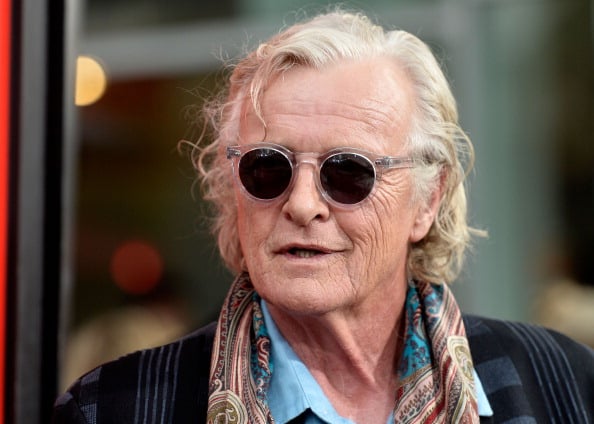Rutger Hauer at a Glance
- Categories: Celebrities > Actors, Celebrities
- Net Worth: $16 Million
- Birthdate: Jan 23, 1944 - Jul 19, 2019 (75 years old)
- Birthplace: Breukelen
- Gender: Male
- Profession: Actor, Writer, Film Producer, Film director
- Nationality: Netherlands
- Height: 6 ft (1.85 m)
## Rutger Hauer: A Life and Legacy in Film and Activism
**Table of Contents**
* [Introduction: A Cinematic Icon](#introduction-a-cinematic-icon)
* [Early Life and the Path to Acting](#early-life-and-the-path-to-acting)
* [Breaking Through: The Early Film Career](#breaking-through-the-early-film-career)
* [The 1980s: Iconic Roles and Hollywood Stardom](#the-1980s-iconic-roles-and-hollywood-stardom)
* [The 1990s and Beyond: A Prolific Career](#the-1990s-and-beyond-a-prolific-career)
* [Television Ventures: Expanding the Artistic Reach](#television-ventures-expanding-the-artistic-reach)
* [Personal Life, Activism, and Legacy](#personal-life-activism-and-legacy)
* [Conclusion](#conclusion)
Introduction: A Cinematic Icon
Rutger Hauer, the Dutch actor who graced both the silver screen and television, left an indelible mark on the world of entertainment. Known for his distinctive presence and versatile acting skills, Hauer captivated audiences with his performances in a diverse range of films, from art house dramas to Hollywood blockbusters. His death in 2019 marked the end of an era, but his legacy continues to resonate with fans and filmmakers alike.
Early Life and the Path to Acting
Born Rutger Oelsen Hauer on January 23, 1944, in Breukelen, Netherlands, Hauer’s early life was shaped by the backdrop of World War II. His parents, Teunke and Arend Hauer, were both actors and ran an acting school in Amsterdam. This environment instilled in him an appreciation for the arts from a young age. Although he briefly attended a Rudolf Steiner school, Hauer’s restless spirit led him to leave formal education at 15, joining the Dutch merchant navy. After a stint at sea, he returned home and worked various odd jobs while completing his high school degree at night. He would later enroll in the Academy of Theater and Dance in Amsterdam, but left to join the Royal Netherlands Army, from which he would also depart due to his discomfort with the use of deadly weapons. This eventually led him back to acting school, which he graduated from in 1967.
Breaking Through: The Early Film Career
Hauer’s breakthrough came in 1973 with Paul Verhoeven’s romantic drama “Turkish Delight,” a film that became a global commercial hit and earned an Academy Award nomination for Best Foreign Language Film. This role showcased his charisma and acting talent, bringing him international attention. Two years later, he made his English-language debut in the British adventure thriller “The Wilby Conspiracy.” He continued to work in Dutch cinema, starring in films like “Katie Tippel,” “Soldier of Orange,” and “Spetters,” solidifying his reputation as a leading man in his native country.
The 1980s: Iconic Roles and Hollywood Stardom
The 1980s marked Hauer’s entry into Hollywood, with his role as the terrorist Wulfgar in the action crime thriller “Nighthawks” (1981). However, his most iconic role came in 1982, as the replicant Roy Batty in Ridley Scott’s science-fiction masterpiece, “Blade Runner.” His portrayal of Batty, particularly his poignant “Tears in Rain” monologue, has become legendary in film history. Following “Blade Runner,” Hauer appeared in various films, including Sam Peckinpah’s “The Osterman Weekend,” Nicolas Roeg’s “Eureka,” and the thriller “The Hitcher.” He also starred in “Ladyhawke” and “Blind Fury,” demonstrating his versatility in different genres.
The 1990s and Beyond: A Prolific Career
Hauer maintained a strong presence in the film industry throughout the 1990s and beyond. He appeared in diverse films such as “Buffy the Vampire Slayer,” “Surviving the Game,” and science-fiction films like “Mr. Stitch,” “Crossworlds,” and “Omega Doom.” He remained consistently active in the 21st century, with notable roles in films like “Sin City,” “Batman Begins,” and “Hobo with a Shotgun.” His filmography shows his dedication to his craft and his willingness to take on a variety of roles.
Television Ventures: Expanding the Artistic Reach
Besides his extensive film work, Hauer also excelled in television. His initial television role was the title knight in the Dutch series “Floris” (1969), directed by Paul Verhoeven. He later played Albert Speer in the ABC television film “Inside the Third Reich” (1982), and Aleksandr Pechersky in “Escape from Sobibor” (1987), for which he received a Golden Globe Award nomination. Hauer also appeared in miniseries like “The 10th Kingdom,” “Salem’s Lot,” and “Flight of the Storks,” and series such as “True Blood,” “Galavant,” and “Porters,” which were among his final roles.
Personal Life, Activism, and Legacy
Rutger Hauer was knighted in the Order of the Netherlands Lion in 2013, a testament to his cultural contributions. Beyond his acting career, he was deeply committed to environmentalism and AIDS awareness. He founded the Rutger Hauer Starfish Association, an AIDS awareness charity, and donated proceeds from his 2007 autobiography to the organization. He was married to Ineke ten Cate from 1985, and they had been together since 1968. Hauer passed away on July 19, 2019, leaving behind a significant body of work and a legacy of artistic excellence.

Frazer Harrison/Getty Images
Conclusion
Rutger Hauer’s career spanned decades and included iconic roles across film and television. His talent, versatility, and dedication to social causes made him a beloved figure in the entertainment world. His roles in “Blade Runner,” “Turkish Delight,” and many others solidified his place in cinematic history. Though he is no longer with us, his work continues to entertain and inspire.

